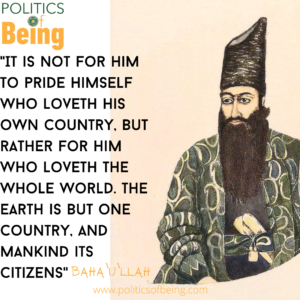
The Vision of Baha’u’llah, Prophet of Humankind’s Unity
From the book chapter: An Evolutive Crisis
Baha’u’llah—“the glory of God” in Arabic— was born in 1817 in Persia. He was the founder of the Bahá’í faith, which is estimated nowadays to have between five and eight million adherents spread throughout the world. He was a follower of Siyyid Mírzá `Alí-Muhammad, a young man who, in 1844, claimed to be the promised redeemer of Islam, the long-awaited Imam Mahdi in Shia Islam, and called himself the Báb (“the gate”). The Báb took that name as he announced the imminent coming of “he whom God will make manifest.” Together with thousands of followers, he was severely repressed and finally killed in 1850.
As one of the Báb’s followers, Baha’u’llah was imprisoned in an underground dungeon of Tehran in 1853, where he had a vision of a maiden from God, who announced his mission as a messenger of God, the one whose coming the Báb had prophesied. Baha’u’llah was soon released from jail but continued to live his life in exile in the Middle East, most often under surveillance or jailed again by the Ottoman authorities. Before his death in 1892 near Acre—now part of Israel—he left an abundant body of works, which established a solid foundation for a new religion. After Abraham, Krishna, Zoroaster, Moses, Buddha, Jesus, Muhammad, and others, Baha’u’llah stated that he was the last Manifestation of God for this age, whose mission was to unite the human race so that a thriving planetary civilization could be established, a new world order whose institutions would embody Bahá’is’ ideals of unity and justice for all. Baha’u’llah considered justice the main condition for the unity of humankind, without which its “well-being [ … ], peace and security, are unattainable.”
“It is not for him to pride himself who loveth his own country, but rather for him who loveth the whole world. The Earth is but one country, and mankind its citizens,” he proclaimed. He taught that religious truth is progressively revealed by God through a series of divine messengers, whose teachings are tailored to suit the needs of the time and place of their appearance, for the progress and advancement of human morals and civilization.
In fact, Bahá’i scriptures consider religion to have “been the basis of all civilization and progress in the history of mankind.” This view of a “progressive revelation” and oneness of all religions is summarized by “Shogi Effendi, who was the head of the Bahá’i faith from 1921 to 1957: The fundamental principle enunciated by Baha’u’llah, the followers of His Faith firmly believe, is that religious truth is not absolute but relative, that Divine Revelation is a continuous and progressive process, that all the great religions of the world are divine in origin, that their basic principles are in complete harmony, that their aims and purposes are one and the same, that their teachings are but facets of one truth, that their functions are complementary, that they differ only in the nonessential aspects of their doctrines, and that their missions represent successive stages in the spiritual evolution of human society”.
These different stages of evolution are considered to be analogous to those of an individual’s life, our current stage being adolescence, which precedes full maturity. As Shogi Effendi put it: “The long ages of infancy and childhood, through which the human race had to pass, have receded into the background. Humanity is now experiencing the commotions invariably associated with the most turbulent stage of its evolution, the stage of adolescence, when the impetuosity of youth and its vehemence reach their climax, and must gradually be superseded by the calmness, the wisdom, and the maturity that characterizes the stage of manhood. Then will the human race reach that stature of ripeness which will enable it to acquire all the powers and capacities upon which its ultimate development must depend”.
In their book on the Bahá’i faith, Hatcher and Martin explain: “Baha’u’llah envisioned the establishment of a World Order as occurring in three successive stages. The first stage is a period of social breakdown and widespread suffering, suffering greater in scope and intensity than any previously known. Bahá’is believe that this first stage is already well advanced and that the turmoil presently afflicting the world will, in time, test every human life and all existing social institutions […] According to Bahá’i belief, the present period of suffering and difficulties will culminate in a worldwide spiritual, physical and social convulsion. This crisis will lead to the establishment of the “Lesser Peace,” in which some of the institutions of this new world order will be established to guarantee political peace. It will be the prelude to the third stage of establishment of the new world order, the “Most Great Peace,” that will come about far more gradually to establish “the Kingdom of God on earth,” the “coming of age of the entire human race” based on the conscious recognition and application of the teachings of Baha’u’llah.
In fact, the works of Baha’u’llah include many teachings related to this new world order that is based on spiritual principles, in particular the oneness of humanity. It will necessitate and allow a major restructuring of political, social, and economic institutions based on an intense dialogue between science and religion, the two systems of knowledge available to humankind. Among his priorities, Baha’u’llah emphasized science and religion, the equality of men and women, universal education, economic justice, cultural diversity, and an auxiliary international language, as well as institutions of international governance: a world government, parliament, code of law, tribunal, police, etc.
